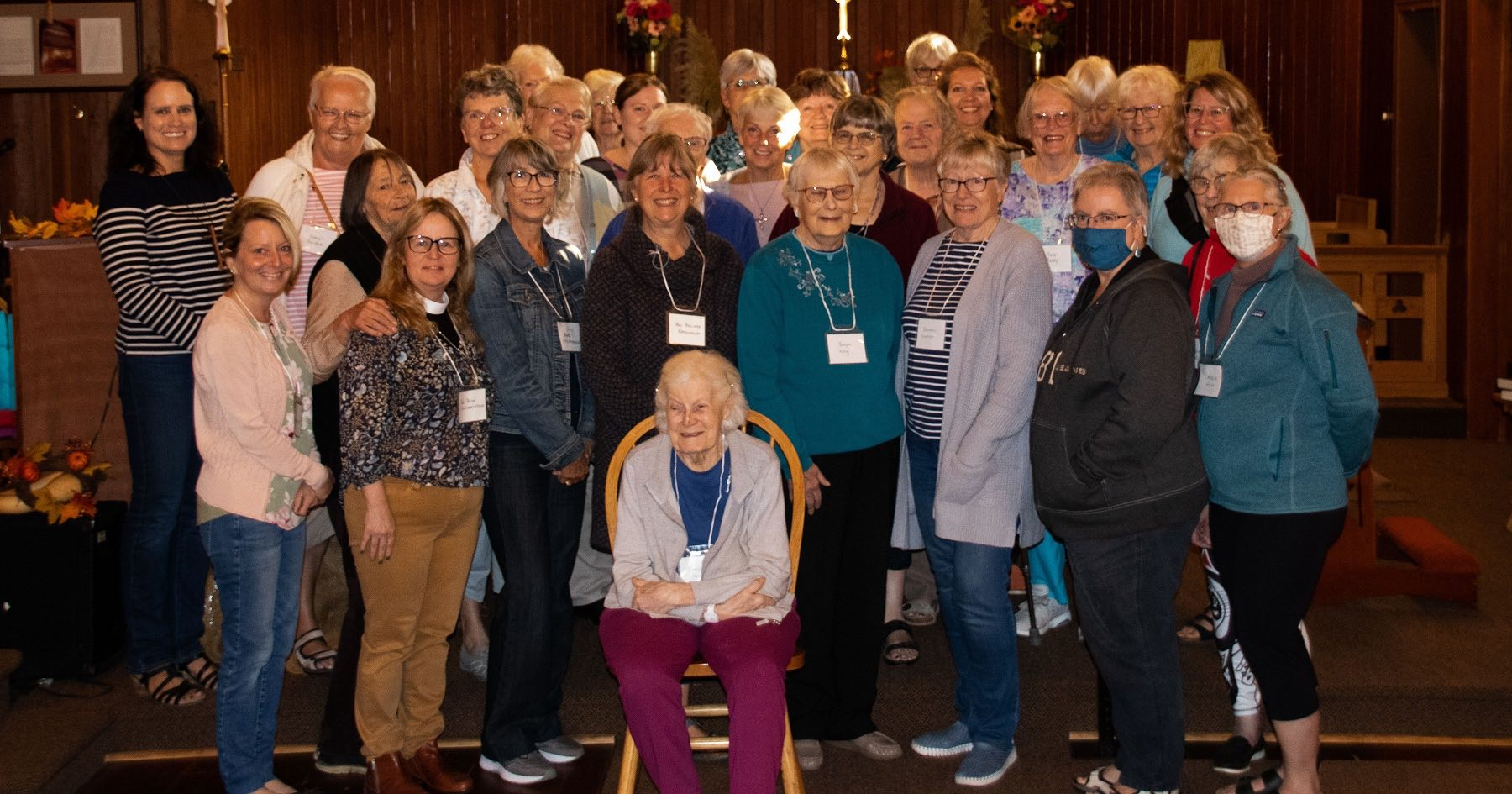The joyous noise of 32 women could be heard in the hall of St John, Duncan as they settled in to the fall women’s retreat. The retreat was facilitated by Bishop Anna Greenwood-Lee, who led the women through how they can find hope in liminal times. The retreat took place on Oct. 14–16 and spiritual direction was provided by Selinde Krayenhoff.
“Liminal” has many meanings, which we found out over the two days of the retreat together (Oct. 16 was a church service presided by the bishop), such as betwixt and between, on the threshold and in a transitory state of being.
We are living in liminal times, and what was once, is gone, and what is meant to be, is not here yet.
We are not alone, nor are we the first people to go through liminal times. In biblical history, the road to Emmaus was travelled by folks experiencing liminal times. Advent and Lent are times of liminality. Christians facing difficult situations today can take comfort in Jeremiah 29:11 (“For I know the plans I have for you…”), knowing that it is not a promise to immediately rescue us from hardship or suffering, but rather a promise that God has a plan for our lives, and regardless of our current situation, he can work through it to help us prosper and give us hope. The Psalms are also a great comfort during times of liminality, as they run the full gamut of emotions.
Our feelings during these uncertain times range between hopelessness, annoyance, exhaustion and anger, all interesting emotions that come with many questions in their wake. During the retreat, we looked at passages from Marc Brackett’s book Permission to Feel, including the mood meter, which is a large colourful graph that plots out many emotions on a chart. We don’t give ourselves enough permission to feel — we are often conditioned by our upbringing to not express our true feelings — and there is a power in being able to name emotions. As Brené Brown says in her book Atlas of the Heart, “Unprocessed emotions are never benign; they are always malignant.”
It is often in these times, between the familiar and the unknown, that new discoveries are made. It is important to not cling to the future nor rush forward. These times have no true beginning nor end date. We are a society that searches for “closure,” which is something invented by those who wish to rush through the process and are uncomfortable in liminality.
Anxiety tends to rise during times of liminality, and although some live in quiet denial, there are many things to be wary of, such as a shift in power dynamics. We may feel that we are in a constant state of distraction, bombarded with information overload from the media, social media and beyond. We should not allow these “tricksters” to deny our feelings, choose our responses and keep us away from critical thinking.
It is not a time to seek revenge and retribution but to pray and settle in. We are in this place for an undetermined amount of time. Light the candles wherever you are, as time is more sacred than place.
We have been down a similar road before with the Reformation, when the Bible was declared the “authority.” But this declaration made for various denominations, and it is now not the clear authority that we can all agree on. This has made way for the clear authority to be what lives in “the conversation.”
Liminality may not be sorted out in our lifetime. However, liminality is not a problem to be resolved. There is a beauty in liminal times. Much like the sunrise, it is the most beautiful time of the day.
Liminality is the time when God works in us more than at any other time. We may feel abandoned, but God is always with us. We must live in confident expectation and with grace and patience. History repeats itself, empires rise and fall, people are displaced, and their lives are changed forever, but God is constant and gives us hope. Hopeful people are not paralyzed by fear of their current situation. We must find the hope and our purpose for this transitory state of being.
We often do not see where the church is living and thriving as we are so focused on what is dying. We cannot allow ourselves to be dragged back and, as it is written in Ecclesiastes 3:1–8, there is “a time to be born and a time to die, a time to plant and a time to harvest…” We must not let the structures that are holding us back win. God is in the process of remaking the world, and we are co-creators in the process.
We are being renewed into what we now know about our past and the hope that we will never again be the institution that created residential schools. Some aspects of where we were needed to die.
We all have the ability to act during these liminal times and it would be great if we could jump into a better way of being, but it is not possible. We must pass through the eye of the needle, come out of the spiritual crisis and be fundamentally changed people.
We need open minds and open hearts. We who will cross the threshold are not alone in this time and space. It is uncomfortable, and many of us do not like change, but we are reminded of the one big change — the day the stone was rolled away and the light shone into the dark cave.
We closed our retreat with a short affirming song by John Bell, which references passages from 2 Corinthians 5:17 and Revelation 21:5. A perfect sending song for finding hope in liminal times.
Behold, behold, I make all things new,
beginning with you, and starting from today.
Behold, behold, I make all things new,
my promise is true for I am Christ the way.




